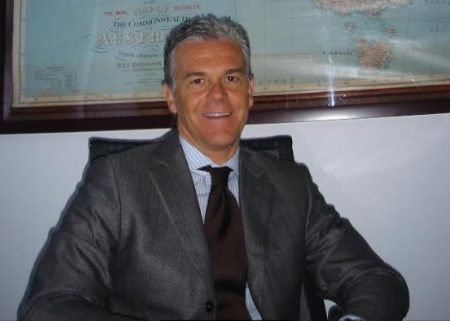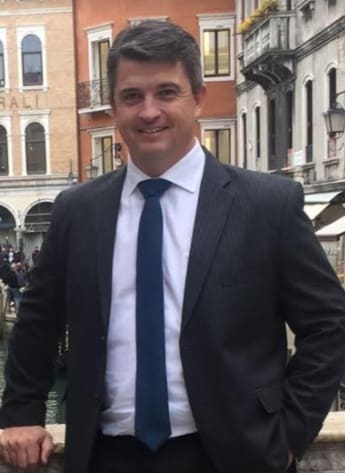
Top maker and Italian Wool Trade Association president Claudio Lacchio.
ITALIAN and Australian wool trade leaders have united behind a call to encourage the production of non-mulesed wool where possible, using mandatory pain relief and genetics to transition from surgical mulesing.
After a recent Sheep Central article featuring Australian Wool Innovation director candidate Chick Olsson’s opinions on mulesing, Italian and Australian wool trade leaders have called for Australian growers to heed market trends regarding animal welfare.
Italian Wool Trade Association president Claudio Lacchio has expressed concern that Australian growers were not receiving the “right message” about the importance of brand demand for non-mulesed wool and of moving away from relying on the practice.
Exporter Josh Lamb, president of the Australian Council of Wool Exporters and Processors, said exporters are well aware that mulesing is a valid management practice for some growers, but this doesn’t negate the need for permanent change.
“The industry shouldn’t be thinking about what the market wants next week, we need to think about what it wants 10 or 20 years from now.”
In the Sheep Central article, Mr Olsson challenged the AWI Wool 2030 strategy’s Pillar 1 statement that by 2030 “Growers have the confidence and tools to manage flystrike without mulesing” as an inferred deadline to halt surgical mulesing.
Mr Olsson has defended mulesing as a perfectly acceptable operation that Australian growers should use as long as they needed to, believing there was no reputational risk in the practice continuing.
“We are still selling all of the wool and they (China) want our raw material and love our product,” he said.
While respecting everyone’s right to have their own opinions, Mr Lacchio said Mr Olsson’s vested interest as a major shareholder in the company that produces the mulesing pain relief product Tri-Solfen should be considered.
Mr Lacchio said took issue with the assumption that China is buying most of Australia’s wool, regardless of whether it is mulesed or non-mulesed.
“For the time being they don’t seem to care about mulesing,” he said.
“China does not care about mulesing for what they consume domestically, but they do buy non-mulesed wool for the brands that demand non-mulesed wool.”
But Mr Lacchio said it is important that Australian growers be told what young wool consumers are demanding and he believes this should be AWI’s main purpose.
“It is not up to us to tell a grower what he should or shouldn’t be doing on his farm.
“This I respect, 100 percent, he can decide to mules or not to mules, or use pain relief,” he said.
But AWI should be telling Australian growers of the preference for non-mulesed wool by brands and processors, he said.
AWI should be telling growers what the market demands

ACWEP president, wool exporter Josh Lamb.
Mr Lamb also said part of AWI’s function is to inform the Australian wool grower of what the market is asking for or expecting.
“It’s not the role of AWI to tell growers what to do, but it is 100 percent their responsibility to provide them with all the information and tools so growers can then make the most informed management and marketing decisions to suit their own clip.”
“The feeling in the industry is that we are finally starting to turn things around in regards to the perception of the Australian wool clip and its practices,” he said.
“The situation is delicately poised but we need to keep moving forward and mandating pain relief and declaring it as such on the NWD is demonstrating transparency.
“But mulesing with mandated pain relief should be seen as transitionary and strictly medium term only,” Mr Lamb said.
“To suggest the Australian wool industry ignores global demand for non mulesed wool coupled with the world moving towards higher welfare standards in animal production would be irresponsible.”
Other countries have moved faster on welfare than Australia
Mr Lacchio said it took Australia more than 30 years to solve the problem of using polyester packs that were contaminating wool and introduce nylon packs, whereas it took South America only a few years.
Mr Lacchio said Mr Olsson should be “bringing the right message” to growers on mulesing in their best interests.
“He should tell the growers what the clients need and want.
“I feel sorry for the growers when the right message is not brought to them.”
Mr Lacchio said he had seen sheep dying from flystrike and appreciates there are areas in Australia where mulesing is probably “a must” for the time being. But he believes growers should not be told to disregard concerns about mulesing and the requirements of brands demanding non-mulesed wool, but be told what brands, topmakers, weavers and spinners want.
“I am a top maker, I want to know what my clients want.”
Mr Lacchio said Australia is already ranked behind other wool-producing countries in its perceived attitude to mulesing. New Zealand (which has banned mulesing) is the most advanced, he said. South America has also moved strongly to producing certified non-mulesed wools and in South Africa more than half the clip is certified (non-mulesed).
“I think it is a pity because Australia produces the best wool in the world and yet if we want to source a specific type of wool certified (non-mulesed), we are not in a position to do so in Australia today, end of story.”
Mr Lacchio did not believe that Mr Olsson’s attitude to mulesing would slow down the growth in non-mulesed wool from Australia.
“I consider the Australian growers intelligent enough to make their own decisions.
“If they think that there is a possibility to provide the market with the right product, especially into Europe and United States, with non-mulesed wool, they will do that.
“At the same time I strongly support the idea that genetically, there must be a way to solve this problem.”
Pain relief for mulesing should be regarded as tools in the transition toward breeding a non-mulesed flock, he said.
“In the areas where it is possible, the goal should be to try to produce non-mulesed wool.”
Mr Lamb also said the long-term solution to mulesing is genetics.
“Plenty of growers have proven in Australia under a wide range of environmental conditions that they can breed their way out of a reliance on mulesing.”
Stuart McCullough’s new position

AWI CEO Stuart McCullough.
Mr Lacchio welcomed the recent appointment of former AWI CEO Stuart McCullough to the position of chief marketing and innovation officer to advocate for wool within the proposed European Union’s Product Environmental Footprint (PEF) Scheme and maximise the post-COVID marketing opportunities.
“I can only welcome if a guy from Australia representing AWI is coming to Europe.
“At least he will understand what is going on – not only the labelling and potential danger of wool being declared more polluting than polyester, for example.
“It is an issue and very important, but also he will understand, why, for example, we ask for non-mulesed wool,” he said.
“For a guy from AWI to come into our environment to feed back to Australia the right messages I can only see it as positive news for us in Europe.”
Mr Lacchio said AWI should be doing more to encourage diversity in processing industries outside of China. His father told him that to have all your eggs in the one basket is not a wonderful marketing strategy.
He doubted the economics of establishing early stage processing Australia just because it would be close to the raw material’s source, suggesting difficulties in sourcing the necessary machinery, experienced technicians and labour.
But Mr Lacchio supported limited development of integrated processing in other countries such as Europe and the United States to balance the industry’s reliance on the China manufacturing sector.



HAVE YOUR SAY